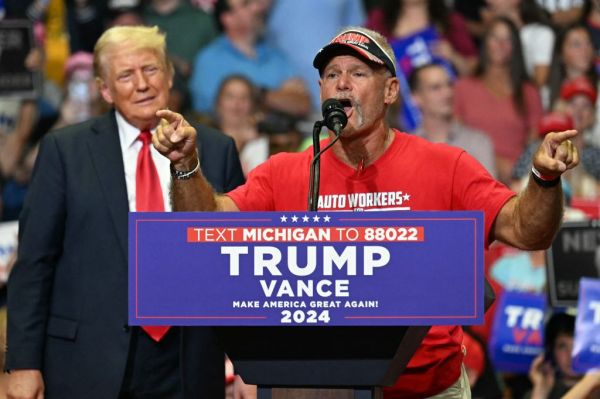
People are throwing the word “landslide” around willy-nilly this week, and while President-elect Donald Trump certainly won a decisive victory and did so in much stronger fashion than his 2016 squeaker, landslide it ain’t.
Trump will end up with 312 electoral votes, adding Nevada to his 2016 haul. That puts him at 57.99 percent of the Electoral College, tied with James Garfield in the election of 1880 at 44th biggest victory out of 60 presidential elections. Trump fits well with Garfield’s era. Ours is the first time since the stretch from 1884 to 1892 that Americans have seen the incumbent party lose three consecutive elections.
Trump’s fellow beefy New Yorker and non-consecutive executive, Grover Cleveland, was the product of a time like our own, in which rough parity between the parties produced a lot of see-sawing and a great deal of public frustration with incompetent, corrupt governance.
But the president-elect’s win is bigger than not only his own victory of 2016, but, also, by 1 point, President Joe Biden’s 2020 total. Trump, though, is well behind both elections for the two other most recent Democratic presidents, Barack Obama and Bill Clinton.
The size of Trump’s margin relative to history does nothing, though, to diminish the size of the blue-to-red shift from 2020 to 2024. It was absolutely a red wave that rolled from coast to coast. In the scenarios we laid out last week, the result was unambiguously the first one: Trump again outperformed his polls substantially. It was an election like 2012 in that it looked close, but really wasn’t.
Given that the shift in the non-swing states was an eye-popping 6.7 points, the fact that the swing states shifted only about 3 points toward the Republicans suggests that Vice President Kamala Harris and her campaign have much to be proud of. So do Democratic Senate candidates in Nevada, Arizona, Wisconsin, and Michigan who managed to avoid getting washed out like incumbent Democrats in Ohio, Montana, and, probably, Pennsylvania. The House will be close, but Republicans may be able to hang on to a razor-thin majority like the one they scratched their way to in 2022.
That shift included big, heavily Democratic cities, as economist Jed Kolko points out: “Many [metropolitan areas] swung more than 10 points toward Trump in 2024 versus 2020, including New York, Los Angeles, Chicago, San Francisco, and Miami, as well as heavily Hispanic/Latino metros in Texas, California, and the Southwest.”
That geographic and demographic snapback has prompted the abuse of yet another election-time buzzword: realignment. Trump’s substantial improvement with black and Hispanic men compared to his previous two runs has made everyone gaga for realignment talk.
“Donald Trump’s return to the White House was powered by a historic realignment of the American electorate that upended decades of traditional coalitions,” says the Washington Post. Trump, of course, agrees.
Ehhhhhhh …
All that loose talk forgets how such a “realignment” was even possible, and depends on a very short-term definition of history.
The only president since 1980 other than Biden that Trump has electoral bragging rights on is his fellow Republican, George W. Bush, who had 53.16 percent in 2004 and 50.47 percent in 2000. And certainly Trump can count some improved showings with nontraditional Republican constituencies as reasons for his advantage over Bush the younger. But not many.
Trump did better with black voters than Bush, and saw gains with younger voters and voters from union households. But Trump did worse with women, Hispanic voters, white voters and older voters than Bush.
If you compare the numbers on the races between Bush and challenger John Kerry in 2004 and the one between Trump and Harris, they look remarkably similar:
2004 Exit Polls vs. 2024 AP VoteCast
- Men: Bush +11 → Trump +11
- Women: Kerry +3 → Harris +7
- White: Bush +17 → Trump +13
- Black: Kerry +77 → Harris +67
- Hispanic: Kerry +9 → Harris +13
- 18-24: Kerry +13 → Harris +10
- 50-64: Bush +5 → Trump +7
- 65+: Bush +5 → Trump +3
- Union household: Kerry +19 → Harris +11
We certainly can see some differences, but overall that doesn’t look anything like a “historic realignment.”
Certainly there are trends that, if they continue, would point in the direction of wholly new coalitions for the parties. But, of course, that’s what they said in the two elections after Bush’s.
That’s when barrier-breaking Obama ran up huge numbers with ethnic minority groups and young voters—first in his big 2008 win (32nd on the landslide list) and then when he faced the severely white Mitt Romney in 2012. It was said again when Trump cratered Republican support with these groups in his first two runs. And yet, here we are, back with something that looks a lot like the 2004 electorate.
Looked at through the lens of this year’s numbers, the period between 2008 and 2020 seems more like a deviation from the norm and not a new normal. The Obama coalition was partly identity politics but also partly the understandable reaction against the party in power after the Iraq war and the financial panic of 2008.
Republicans wanted to try to get the demographic band back together for 2016, but Trump had other ideas. Lots of them. Lots and lots and lots. Since then, two things have changed. Trump and his team have gotten better and smarter about courting minority voters. Not always gracefully, but ultimately effectively. The campaign’s closing ad blitz on transgenderism was brutally effective and aimed squarely at black men.
But also, voters in all demographic groups were fed up with the Biden administration, particularly about the high prices that resulted from the (bipartisan) pandemic spending spree and, maybe most devastatingly for Democrats, the wave of migrants that entered the country after Biden lifted Trump’s restrictions and then waited too long to start clamping down again.
We could credit Trump’s macho vibes or arrest record or sneaker sales for the improvements in urban precincts listed above, or we could point to Texas Gov. Greg Abbott who decided to start sending busloads of migrants to big cities in the north and spreading the pain around.
Certainly, the extraordinary shift of Latino-dominated counties on the U.S.-Mexico border would seem to suggest that the migrant surge played perhaps the biggest role in the red wave of 2024.
Nor can we overlook the role that sexism played. As white progressives learned painfully in the battles over gay marriage during the Bush and Obama years, ethnic minority voters can be far more averse to cultural change than the white majority. While most affluent Americans might not be bothered by the idea of a woman president, it’s hardly unthinkable that working-class Americans, including black and Hispanic voters, may have had reservations about it.
Which is a long way of saying that there isn’t one reason Trump did better this time with black and Hispanic voters than he did in his first two runs. I’m prone to think, though, that the economy and the migrant crisis are the biggest ones.
I think what we had was a fundamentals election, not a vibes election. Voters were unhappy with the party in power and turned them out. The chaos of Trump’s term had faded from memory, but aggravation with the Biden team’s missteps remained fresh.
After every election, particularly with a change in party, the temptation is to declare new coalitions and lasting change in our political alignments. But we would do well to remember that even in a sharply divided electorate like ours, four years provides plenty of time for elasticity.
Will Republicans keep the minority and working-class voters they recovered after the 2008-2020 drought? Will Democrats be able to absorb the white, college educated voters who fled Trump? Those things will not primarily depend on vibes, either.
Trump had a lot to do with creating the circumstance where getting less than a third of black voters and underperforming Bush by 10 points with Hispanic voters would appear to be a “historic realignment.” Obama’s wins were certainly a big part, but Trump finished the job with his rhetoric and first presidency.
Biden’s unpopular administration let the GOP get back to par with groups that had rejected the party in historic numbers for 16 years. They’re not going to stick around because they like Trump’s swagger. If Republicans make a hash of things again, we’ll be doing the realignment shuffle four years from now.
Democrats got spanked this time because they misunderstood what voters were saying in the 2020 and 2022 elections, and that started with imagining a mandate and a realignment that hadn’t occurred. Humility is hard to come by in politics, but it is the essential ingredient in any lasting success.
Holy croakano! We welcome your feedback, so please email us with your tips, corrections, reactions, amplifications, etc. at STIREWALTISMS@THEDISPATCH.COM. If you’d like to be considered for publication, please include your real name and hometown. If you don’t want your comments to be made public, please specify.
TIME OUT: PROBABILITIES ARE BANANAS
BBC: “Known as the ‘infinite monkey theorem’, the thought-experiment has long been used to explain the principles of probability and randomness. However, a new peer-reviewed study led by Sydney-based researchers Stephen Woodcock and Jay Falletta has found that the time it would take for a typing monkey to replicate Shakespeare’s plays, sonnets and poems would be longer than the lifespan of our universe. … The results indicated that even if every chimp in the world was enlisted and able to type at a pace of one key per second until the end of the universe, they wouldn’t even come close to typing out the Bard’s works. … There would be a 5% chance that a single chimp would successfully type the word ‘bananas’ in its own lifetime. And the probability of one chimp constructing a random sentence – such as ‘I chimp, therefore I am’ – comes in at one in 10 million billion billion.”
WITHIN EARSHOT: THE PERFECT KINSLEY GAFFE
“We dug out of a deep hole, but not enough.”—David Plouffe, senior adviser to the Harris campaign, takes a jab at President Biden in a post-election tweet thanking supporters and staff. Plouffe has since deleted his account.
You should email us! Write to STIREWALTISMS@THEDISPATCH.COM with your tips, kudos, criticisms, insights, rediscovered words, wonderful names, recipes, and, always, good jokes. Please include your real name—at least first and last—and hometown. Make sure to let us know in the email if you want to keep your submission private. My colleague, the indefatigable Nate Moore, and I will look for your emails and then share the most interesting ones and my responses here. Clickety clack!
CUTLINE CONTEST: THE ULTIMATE REALIGNMENT

This week’s winner did what the best always do: Kept it short, simple, and with no need for extra context. Which is nice, because it makes my job easier in the introduction!
“Smiles emerge as the Sweet Meteor of Death approaches”—George Spence, Bentonville, Arkansas
Winner, Stay Puft Division:
“Election result onlookers attempt to clear their minds after Gozer commands that they ‘choose the form of their destructor.’”—Cannon Alsobrook, Smyrna, Georgia
Winner, Steamboat Willies Division:
“Voters react as ‘Mickey Mouse’ attains 270 electoral votes.”—Linda McKee, DuBois, Pennsylvania
Winner, Attention Shoppers Division:
“Anticipation mounts as history’s last Blue Light Special features presidential candidates at a price you won’t want to miss.”—Michael Smith, Georgetown, Kentucky
Winner, Electoral Hangover Division:
“In a lively round of Votable Potables, the crowd prepare to take another slug when the candidate says ‘fair share.’”—Bill Ward, St. Augustine Beach, Florida
Winner, Sheaf Throwing Division:
“In the dull moments between voting updates, the audience marvels as Stirewalt and Moore compete in various feats of strength competitions.”—Paul Williams, Shaker Heights, Ohio
Winner, Error Message Division:
“Democratic poll watchers get the blue screen of death.”—Mark Swedberg, Natal, Brazil
FRIENDLY FIRE
Politico: “The Pentagon … said it was unable to confirm reports that North Korean troops are taking advantage of their more expansive internet access in Russia to consume copious amounts of online pornography. U.S. Department of Defense spokesperson Maj. Charlie Dietz said he couldn’t verify ‘any North Korean internet habits or virtual ‘extracurriculars’’ taking place in Russia, saying the Pentagon is only concerned with the ‘more serious’ aspects of the North Korean military relationship with Russia as it wages war on Ukraine. … His comments came in response to a report, first posted to social media by Financial Times commentator Gideon Rachman, that North Korean troops are ‘gorging on pornography’ thanks to their newfound online freedom. While internet access is not unfettered in Russia, it is freer than in North Korea, one of the world’s most restrictive countries.”









Please note that we at The Dispatch hold ourselves, our work, and our commenters to a higher standard than other places on the internet. We welcome comments that foster genuine debate or discussion—including comments critical of us or our work—but responses that include ad hominem attacks on fellow Dispatch members or are intended to stoke fear and anger may be moderated.
With your membership, you only have the ability to comment on The Morning Dispatch articles. Consider upgrading to join the conversation everywhere.